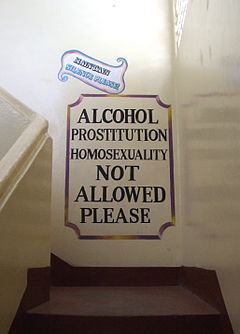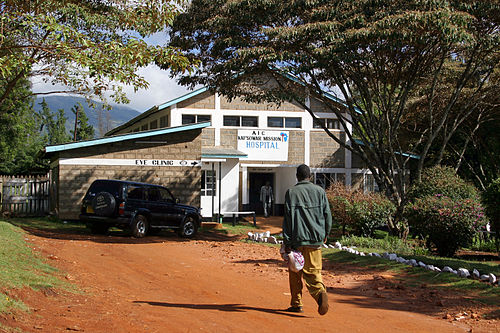Male Sex Workers in Sub-Saharan Africa

Overview
While the majority of attention is usually given to female sex workers, a new report has shed some light on the dire situation of the male sex worker (MSW) industry in Women and African Economic Development. Decades of interventions, programs and funding have been directed to the women in the industry, but men doing the same work have rarely benefitted from these services. The new report, “An Exploratory Study of the Social Contexts, Practices and Risks of Men Who Sell Sex in Southern and Eastern Africa,” was conducted on behalf of Oxfam GB with funding from United NationsDP and researched in conjunction with the South African Sex Workers Education and Advocacy Taskforce. The aim of the research was “to explore the social contexts, life experiences, vulnerabilities and sexual risks experienced by men who sell sex in Southern and Eastern Africa, with a focus on five countries; Kenya , Namibia , Gender Equality in South Women and African Economic Development, Uganda Zimbabwe .”Paul Boyce (UNDP)and Gordon Isaacs (SWEAT), “An Exploratory Study of the Social Contexts, Practices and Risks of Men Who Sell Sex in Southern and Eastern Africa” The report finds that many men get into this line of work after being rejected by their families because of their sexuality or because they are unable to find other jobs in which they can make a decent living. While the profession is fraught with risks, many MSWs interviewed also spoke to the positive impacts their work has had for them including an increased sense of independence from the money they earn, boosted self-esteem, ability to set their own working hours, developed social networks and the possibility to understand their own sexuality.IRIN PlusNews: “AFRICA: New light shed on male sex work,” June 20, 2011
boosted self-esteem, ability to set their own working hours, developed social networks and the possibility to understand their own sexuality.IRIN PlusNews: “AFRICA: New light shed on male sex work,” June 20, 2011
Issues
Particularly important are the report’s revelations concerning the pressures that male sex workers face to hide their existence and the inability for them to get adequate help and sexual education. Male sex workers may identify themselves as homosexual, heterosexual or transsexual yet regardless of their personal sexual identity, they frequently engage in varioussexual acts depending on their clients. In many African countries, there is often a profound denial by government officials and society at large that women would consider paying a man for sexual services or that a man would have intercourse with another man. Because of these prejudices, the existence of male sex workers is often ignored or denied by the government which has contributed to their social marginalization and the inability of MSWs to receive prevention education or treatment for sexually transmitted infections.Consultancy Africa Initiative: Maya Zozulya, “Male sex workers in Nigeria: Ignoring the ‘oldest profession’”
 As a minority group, their human rights are often violated and abused. Exceptions exist, but many health care professionals in these countries treat male sex workers as pariahs. MSWs have reported that they are often ridiculed at clinics and hospitals and have been in situations where nurses call over their colleagues to “come look at what his type of STI is, we have never had it at this hospital before.” Especially in rural areas, there is also the risk that health care providers will tell people in the community about their activities. MSWs ineffectively try to treat their infections on their own to avoid being publicly ‘outed’ which they fear could lead to them being outcast, abused or even killed.IRIN PlusNews: “KENYA: Rural MSM too afraid to access HIV health services,” June 14, 2011
As a minority group, their human rights are often violated and abused. Exceptions exist, but many health care professionals in these countries treat male sex workers as pariahs. MSWs have reported that they are often ridiculed at clinics and hospitals and have been in situations where nurses call over their colleagues to “come look at what his type of STI is, we have never had it at this hospital before.” Especially in rural areas, there is also the risk that health care providers will tell people in the community about their activities. MSWs ineffectively try to treat their infections on their own to avoid being publicly ‘outed’ which they fear could lead to them being outcast, abused or even killed.IRIN PlusNews: “KENYA: Rural MSM too afraid to access HIV health services,” June 14, 2011
While the profession already comes with increased security risks, MSWs face the additional problem of police brutality. Not only are MSWs unable to turn to the police for help if they are attacked by a client, but the police in many of these African states are often their worst aggressors.IRIN News: “AFRICA: Male sex workers face silence, denial and hostility,” September 24, 2003 Interviewees reported being stopped by police and having their money taken and even being raped (typically unprotected) and abused by them.
MSWs and HIV/AIDS
Undeniably, the most pressing problem facing male sex workers in Africa is the prevalence of HIV/AIDS/AIDS and the lack of education and treatment. Because of the prejudice and denial of their existence, MSWs are often excluded from research, policy and programs for HIV/AIDS/AIDS. While infection is also a tremendous problem for female sex workers in Africa, studies show that the risk of HIV infection is almost 20 times higher with unprotected anal sex than with vaginal intercourse.Statistics for how many MSWs are infected is unreliable due to the fact that even the number of MSWs in each country is unknown. However, based on interviewee responses, it is clear that there is a lack of basic knowledge about the transmission and prevention of infection. Additionally, other problems include the inaccessibility of water-based lubricants (which prevents the condom from breaking), substance abuse, high financial incentives for unprotected sex and the judgment they encounter by medical workers when they seek testing or treatment.
Recommendations
Given that the industry has been ignored and hidden for so long, improvements will take time and significant effort by all parties involved. Various international organizations and United Nations agencies have begun developing recommendations and programs for African countries to implement, but the governments themselves will have to first accept the fact that MSWs exist within their borders before any meaningful changes can be made. By opening up the dialogue around the male sex worker industry and the problems that exist, there is hope that the underlying societal and cultural issues can be dealt with.
References
See also
- HIV/AIDS/AIDS
- Prostitution
- United NationsDP


